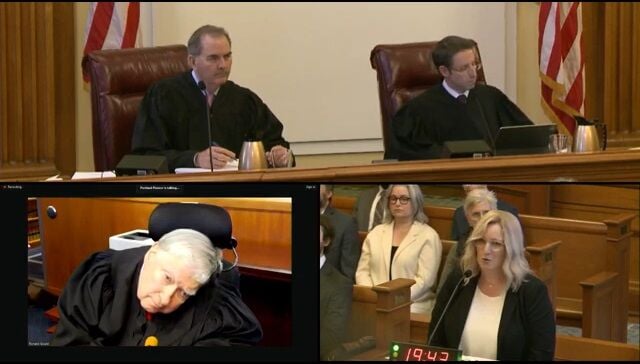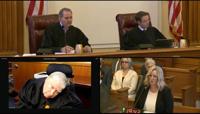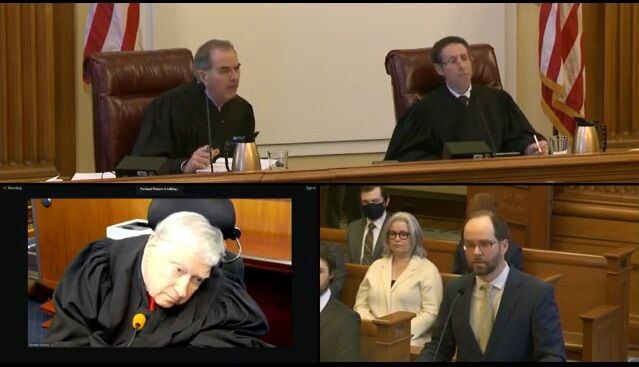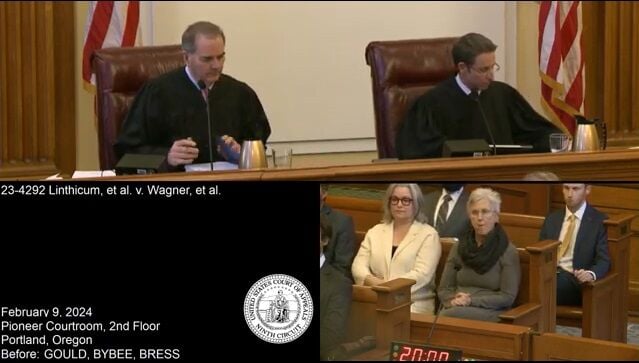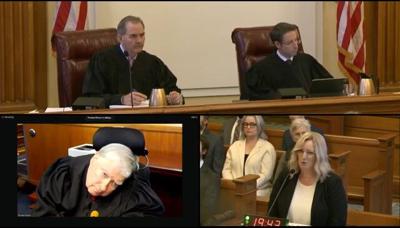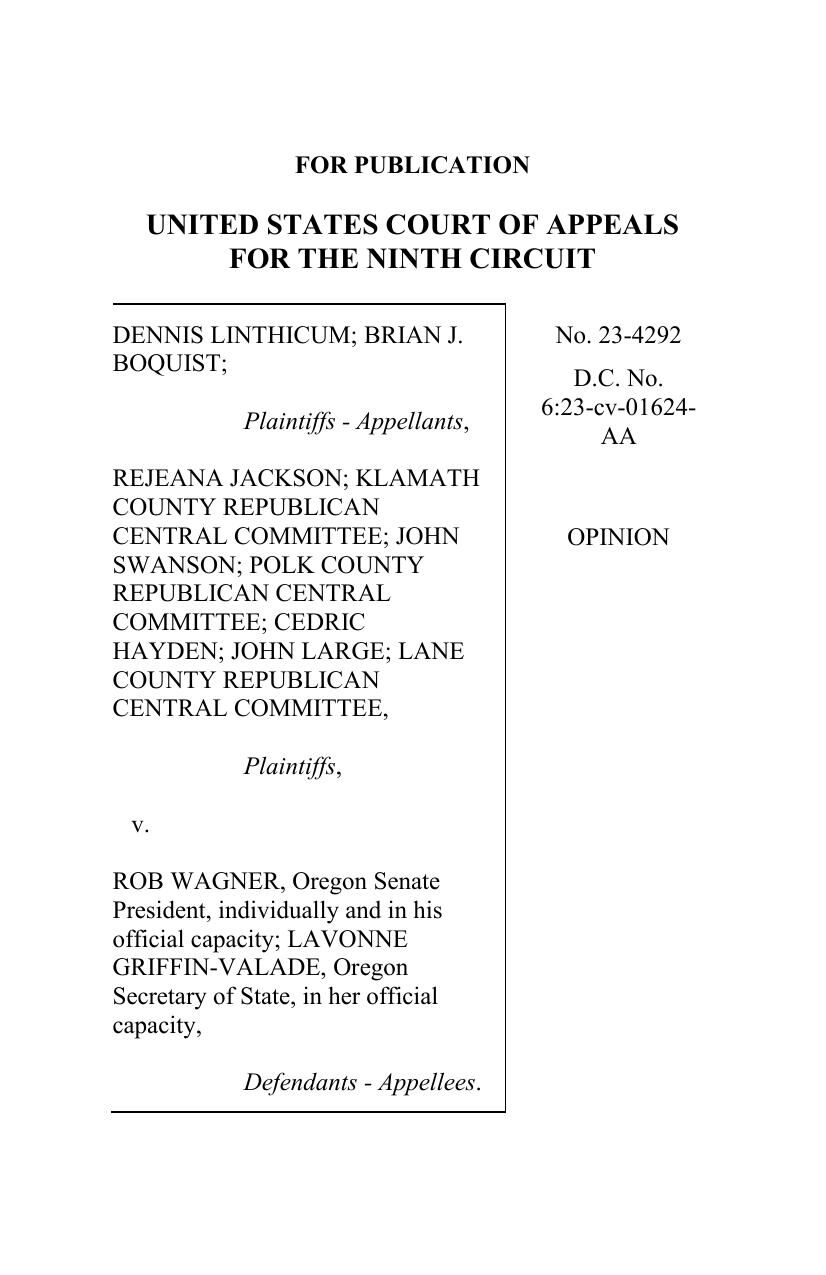KLAMATH FALLS, Ore. & SAN FRANCISCO, Cal. -- An updated federal case filing by the U.S. Court of Appeals for the Ninth Circuit includes a new summary to its opinion against three Oregon state senators and their co-plaintiffs today.
The court's filing also maintains wording that, "The freedom of speech protected by the First Amendment, although colloquially denominated a right, is better characterized as a privilege or an immunity."
That phrasing is part of a concurring opinion written into the case by Judge Jay Bybee of the Ninth Circuit Court as part of a three-judge panel that denied an injunction requested by three Oregon State Senators.
Oregon State Senator Dennis Linthicum from Klamath County is lead plaintiff in Linthicum et al v. Wagner et al: Ninth Circuit Court's opinion below.
Linthicum and his colleagues District 12 Senator Brian Boquist and District 6 Senator Cedric Hayden filed a federal case requesting an injunction against Oregon Senate President Rob Wagner and Oregon Secretary of State LaVonne Griffin-Valade. The senators wanted to prevent Wagner and Griffin-Valade from ruling the senators are ineligible for reelection based on legislative absences during the 2023 Oregon legislative session.
As Oregon Senate President, Wagner decides and tracks senators' absences from legislative session days, and Griffin-Valade decides which candidates for public office get listed on election ballots.
Those senators had accumulated at least ten unexcused absences in the 2023 Oregon legislative session. The senators' unexcused absences triggered Oregon Measure 113, passed by state referendum as an amendment to Oregon's Constitution. It prevents lawmakers who have at least 10 unexcused absences from election to the Oregon legislature's next term after the term with absences ends.
The Ninth Circuit Court opinion upholds a ruling by a U.S. district court in Oregon, where the case was filed, that denied Linthicum et al an injunction against Wagner and Griffin-Valade based on the senator's position that their absences were a form of political speech and disqualifying them for reelection is punishment, or retaliation, for their exercise of free speech.
The Ninth Circuit's new summary issued yesterday says, "The panel held that the Senators were unlikely to prevail on the merits of their First Amendment retaliation claim. Walkouts by legislators to deny a quorum to conduct business in the legislature are exercises of legislative power not protected under the First Amendment under the Supreme Court’s decision in Nevada Commission on Ethics v. Carrigan, 564 U.S. 117 (2011). The panel thus rejected the Senators' claim and further held that the First Amendment does not protect the Senators from the application of Article IV, § 15 of the Oregon Constitution."
In its original opinion filed one week ago, the Ninth Circuit Court wrote, "No private citizen enjoys the privilege to advance or frustrate legislative action directly in the legislature. The ability to stymie legislation by absenting oneself from a meeting of the Oregon Senate belongs to Senators alone. The use of that power therefore implicates the 'governmental mechanics' of the legislative process, and Carrigan makes clear that a legislator 'has no right' under the First Amendment to use that official power 'for expressive purposes.' ... The Senators attempt to claim a personal First Amendment right to walk out, but Carrigan is clear that '[t]he legislative power thus committed is not personal to the legislator but belongs to the people; the legislator has no personal right to it.' ... We accordingly reject the Senators’ claim that their walkout is anything other than an exercise of legislative power."

Linthicum et al. v. Wagner et al. in federal court in Portland, 2.9.24, to U.S. Court of Appeals for the Ninth Circuit, Judges D. Bress, J. Bybee, R. Gould
Capitol Legal Services attorney Beth Jones represents the three state senators, with coplaintiffs including three Oregon voters and three support entities. She says the case is not intended to challenge Oregon Measure 113, now a state constitutional amendment; it intended to challenge Measure 113's effects as wielded by Wagner's individual prerogative to decide what constitutes an excused legislative absence and and Valade-Griffin's individual decisions about how absences get used to disqualify candidates for office.
Linthicum has other arguments about Oregon Measure 113, suggesting it is a legislative mechanism for a political majority in Oregon to strategically target and remove from office unpopular opposing minority political viewpoints.
The United States Supreme Court protects unpopular viewpoints, whether expressed in words or actions. The Ninth Circuit Court's ruling suggests repeatedly the U.S. Constitution's right to free speech in the First Amendment is a privilege, while also a guaranteed right -- but not in the legislature.
Judge Bybee wrote, "We enjoy a privilege to speak freely, including the privilege of criticizing our elected officials, and the government has no right to suppress our criticism. Stated alternatively, our speech is generally immune from government regulation because the government is disabled by the First Amendment. The First Amendment deprives the government of power to suppress our speech... If there is any question of the scope of the powers conferred on the legislature, the First Amendment makes clear the power to abridge speech is affirmatively withdrawn."
He continues, "The fact that we have a privilege to speak our minds freely does not confer an unlimited and freewheeling immunity from the consequences of our speech... For that reason, the First Amendment does not withdraw from the government the ability to regulate conduct unrelated to the content of one’s expression, even if the regulation 'has an incidental effect on some speakers or messages but not others.'"
The U.S. Supreme Court has supported unpopular viewpoints whether put into words or in action. It protected very unpopular political positions displayed as words on placards at a Marine's funeral from a 2006 case, Snyder v. Phelps 131 S. Ct. 1207 (2011), and it protected an unpopular political stance expressed as action, flag burning, in Texas v. Johnson 491 U.S. 397 (1989).
Linthicum also had argued the language of Measure 113 meant he and other senators are eligible for reelection to the term immediately following the term in question because it would not end until two-to-three months after the reelection voting day.
Griffin-Valade set aside that argument, despite its literal application, saying Oregon voters' Measure 113 intent was to prevent absentee lawmakers from returning to the legislature the next term. She also said her office alone has authority to determine who is eligible for candidacy on Oregon ballots. That position surfaced about the time last fall when NewsWatch 12 noticed Senator Linthicum's candidacy filing for reelection was electronically removed Sept. 20, 2023, from the Secretary of State's online list of filed candidates and asked the Senator if he'd withdrawn his candidacy.
Senator Linthicum filed a lawsuit in Oregon to settle the reelection eligibility issue. He told NewsWatch 12 on February 6, 2024, he planned to appeal an Oregon Supreme Court ruling then against his eligiblity for reelection. That message echoed in his social media post last month indicating he intends to pursue the issue to its legal point of exhaustion.
He posted on X, "Despite the recent Oregon Supreme Court ruling, we are still fighting. We will not stop until we exhaust every option to fight for free speech. Another challenge is in the Ninth Circuit Court of Appeals, and a verdict is expected before the primary election cutoff date this year."
That ruling is now on file with the Ninth U.S. Circuit of Appeals which wrote, "Actions have consequences."

Linthicum et al. v. Wagner et al. in federal court in Portland, defense attorney argues, 2.9.24, to U.S. Court of Appeals for the Ninth Circuit, Judges D. Bress, J. Bybee, R. Gould
The Ninth Circuit noted that Linthicum et al invoked the First Amendment for protection of their perceived rights under the amendment. It includes rights to freedom of religion, freedom of speech, freedom of press, right to peaceful assembly/gatherings, and the right to petition government to address grievances.
The Ninth Circuit Court's opinion in this case said, "When those actions might be described as expressive in nature, the First Amendment sometimes protects us from the repercussions that follow. This is not one of those instances."
It continues, "A recent amendment to Oregon’s Constitution disqualifies from the next election any state senator or representative who has accrued ten or more unexcused absences from legislative floor sessions."
Linthicum has contended that when used as a tool to preclude a political perspective, or small group, from a voice in representative government, then the Oregon measure to preemptively disqualify otherwise qualified candidates from elective office candidacy prevents the public from choosing whether those candidates are most fit to represent them in office, denying political First Amendment rights of the candidates and their supporters.
The 9th Circuit noted that Linthicum et al wanted a preliminary injunction from the federal court to nullify the Oregon measure, "arguing that they should not face the consequences of their walkout under the Oregon Constitution because their absences constituted a protest protected by the First Amendment to the U.S. Constitution. Under Nevada Commission on Ethics v. Carrigan, 564 U.S. 117 (2011), we must disagree. We affirm the district court’s denial of a preliminary injunction."
The Ninth Circuit also noted the Oregon Senate absence tracking protocol, noting that Linthicum had 32 unexcused absences and Boquist had 30, setting aside Linthicum's argument throughout the process that he was challenging the Senate Majority's application of some state legislative process; "In written excusal requests to Wagner, Senators Linthicum and Boquist explained that they were 'protesting the refusal of the Senate to comply' with certain Oregon laws and rules dealing with the readability of legislative summaries. Wagner did not grant their excusal requests."
The federal court also notes that Wagner reversed some approved absences after-the-fact as, "He also 'revised prior approvals for absences on and following May 6, 2023, and reversed prior approvals for absences due to a family event, a garden show, a family member[’]s graduation, and to care for parents.' The record indicates that Wagner’s strict enforcement of the absence policy applied to members of both parties. . . Wagner denied excusal requests from other Senators, including for visits to family, family health issues, illness, a wedding, and a child’s high-school graduation. He also denied repeated requests for excusals from Senators Linthicum and Boquist on the basis of their protest."
Boquist's Senate district includes rural Polk & Yamhill counties, Hayden's district covers much of Eastern Lane and Douglas Counties, and Linthicum's Senate District 28 includes all or part of five Jackson, Klamath, Lake, Deschutes and Crook counties.

